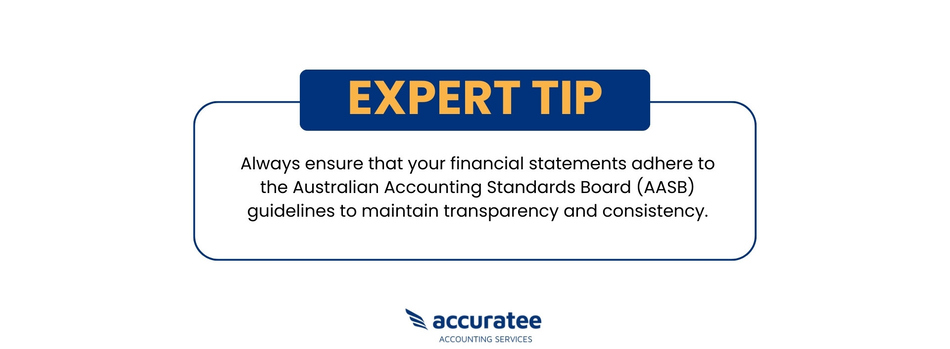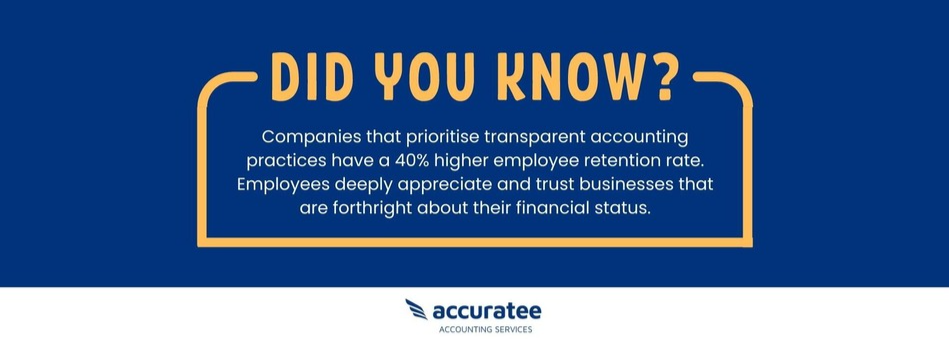The importance of transparency in accounting
Introduction:
In today's dynamic business landscape, trust is the cornerstone of any successful enterprise, especially for small businesses that thrive on community and customer relationships. One of the most pivotal elements in building this trust is maintaining transparency in accounting practices.
Accounting, often referred to as the "language of business," provides stakeholders with a clear picture of a company's financial health. For small businesses, where every decision can have significant ramifications, transparent accounting isn't just a best practice—it's a necessity.
This blog delves into the importance of transparency in accounting for small businesses, highlighting its role in fostering trust, ensuring compliance, and paving the way for sustainable growth.
Key takeaways
Transparency in accounting is foundational for small businesses, fostering trust within the ever-changing business environment.
Transparent accounting empowers informed choices by revealing a company's strengths, weaknesses, and growth potential.
Transparent accounting fuels long-term success, facilitating strategic planning and sustainable expansion.
Transparent practices elevate employee retention rates, showcasing that businesses valuing honesty inspire loyalty.
CleanSlate's ISO 27001 certification, tailored support, and cost-effective solutions exemplify dedication to transparency and data security.
What is transparency in accounting?
Transparency in accounting refers to the complete disclosure of a company's financial information to its stakeholders. Transparency is achieved when a company openly shares their financial statements, balance sheets, and cash flow statements. This level of openness is critical in establishing trust and credibility with shareholders, investors, and other interested parties.
Without transparency, stakeholders may not have a clear understanding of a company's financial health or direction, which can lead to miscommunication or mistrust. Transparency in accounting is a fundamental component in the success and longevity of any business.
Key elements of transparency in accounting for small businesses
For small businesses, understanding the nuances of transparency in accounting can be the difference between gaining trust and losing opportunities. Here's a breakdown of the essential elements:
-
Accountability
This means being answerable for your financial decisions and actions. Just as you'd want to know where every dollar goes in your business, your stakeholders (like investors, partners, and even employees) want to see that you're responsible with the finances. It's about showing that you're making decisions in the best interest of the business and its stakeholders.
-
Detailed documentation
Keeping clear records is crucial. Whether it's an invoice, a purchase order, or a contract, every financial transaction should be documented. This not only helps in tracking expenses and incomes but also in showcasing transparency to anyone who reviews your financial records.
-
Openness with financial plans
Just as you might preview a product launch or a new service, giving a glimpse into your financial plans can be beneficial. It can attract potential investors and partners, and even build trust with your existing stakeholders.
-
Prompt communication
Whether you're informing a supplier about a payment or updating a stakeholder about a financial decision, timely communication is key. It shows that you're proactive and value transparency.
-
Regular reporting
Periodic financial reports, even if only for internal use, can help track the business's health and growth. It's a transparent way to see where the business stands and where it's heading.
-
Adherence to standards
Especially if you're looking to expand or get external funding, adhering to accounting standards is crucial. It not only ensures you're on the right track but also builds credibility with external entities.

Why transparency in accounting matters for small businesses?
In the world of business, especially for small enterprises, the way you handle your finances speaks volumes.
Transparent accounting isn't just about being open; it's about building trust, making informed decisions, and setting your business up for long-term success.
But why is it so crucial? The points below shed light on its significance:
-
Making informed decisions
Having a clear understanding of finances through transparent accounting practices enables businesses to make well-informed decisions. It provides a comprehensive view of the company's strengths, weaknesses, opportunities, and threats. This clarity ensures that every strategic move, whether it's related to marketing, product development, or hiring, is based on solid financial data.
-
Avoiding unpleasant surprises
Transparent accounting acts as a preventive measure against potential financial pitfalls. By ensuring that all transactions, expenses, and incomes are accurately recorded and openly available for review, businesses can proactively address discrepancies or anomalies. This proactive approach ensures smooth operations and reduces the risk of unforeseen financial challenges.
-
Attracting investments
Investors are naturally drawn to businesses that offer clear and transparent financial statements. Transparent accounting not only showcases the business's current financial status but also indicates its commitment to honesty and integrity. For small businesses seeking investments or loans, this transparency can be the deciding factor in securing the necessary funds.
-
Ensuring long-term success
For any business, especially small ones, planning for the future is crucial. Transparent accounting provides the insights and data required for effective long-term strategic planning. By understanding current financial standings, businesses can set realistic goals, allocate resources efficiently, and chart a path towards sustainable growth.
Role of technology in transparent accounting
In today's fast-paced digital era, technology has become an indispensable ally in various sectors, including accounting. The integration of technology in accounting has not only streamlined operations but has also brought about a level of transparency that was previously unattainable. Here's a deeper look into how technology plays a pivotal role in ensuring transparent accounting:
-
Real-time access with cloud computing
Cloud-based accounting platforms allow businesses to store and retrieve financial data in real-time. This ensures that stakeholders, from business owners to auditors, can access up-to-date financial information, fostering transparency and trust.
-
Blockchain for immutable records
Blockchain technology, with its decentralised and tamper-proof ledger, offers a level of transparency that's revolutionary. Every financial transaction recorded on a blockchain is time-stamped and immutable, ensuring complete transparency and traceability.
-
Data analytics for insightful reporting
Advanced data analytics tools enable accountants to analyse vast amounts of financial data swiftly. This not only helps in accurate financial forecasting but also in detecting anomalies or potentially fraudulent activities, ensuring that financial statements are transparent and trustworthy.
-
Artificial intelligence (AI) for predictive analysis
AI-driven tools can predict future financial trends based on historical data. This aids businesses in making informed decisions and also ensures stakeholders are aware of potential financial trajectories.
-
Mobile accounting for on-the-go access
Mobile accounting applications ensure that financial data is accessible anytime, anywhere. This real-time access ensures that stakeholders are always informed, promoting transparency.
-
Interactive dashboards
Modern accounting software often comes with interactive dashboards that provide visual representations of financial data. This makes it easier for stakeholders to understand financial positions, trends, and anomalies, further promoting transparency.
Incorporating these technological advancements into accounting practices can significantly enhance transparency, ensuring that small businesses maintain credibility and foster trust among their stakeholders. As the business landscape continues to evolve, embracing technology will be crucial for businesses aiming for growth and sustainability.
Expert Bookkeeping at Your Fingertips!
Best practices for maintaining transparency in accounting
-
Establish core values
Core values act as the guiding principles for any organisation. In the realm of accounting, values such as honesty, integrity, and openness are paramount. These values not only dictate how financial transactions are recorded but also influence the overall culture of transparency within the company.
When these values are deeply ingrained in the company's ethos, they ensure that all financial dealings are above board, and stakeholders can trust the financial statements and reports generated.
-
Foster a transparent work environment
The work environment plays a significant role in promoting transparency. Encouraging a culture where employees feel free to ask questions, seek clarifications, and voice concerns about financial matters ensures that there's no information asymmetry.
Cross-departmental collaborations can break silos, leading to a more holistic understanding of the company's financial health. Regular feedback sessions can act as platforms for addressing any concerns and reinforcing the importance of transparent accounting practices.
-
Maintain an open-door policy
An open-door policy signifies that the leadership, including top management and financial heads, is approachable. Employees and other stakeholders should feel comfortable seeking clarifications directly from leaders.
Such a policy not only promotes trust but also ensures that any discrepancies or concerns about financial matters are addressed promptly. It underscores the leadership's commitment to transparency and accountability.
-
Regular audits and reviews
Regular audits, both internal and external, act as checks and balances for a company's financial operations. They validate the accuracy and authenticity of financial data, ensuring that the company's financial statements are a true reflection of its financial health.
By sharing audit findings and addressing any discrepancies, businesses can further bolster their commitment to transparency. Regular reviews, on the other hand, can help in identifying areas of improvement and ensuring that best practices in transparent accounting are always followed.
-
Separation of duties for enhanced transparency
To promote transparency in accounting, it's essential to distribute responsibilities like financial reporting and strategy formulation among different teams or individuals. This division of tasks ensures that no single entity can unduly influence or manipulate financial data.
By keeping these roles distinct, organisations can maintain the objectivity and integrity of their financial information, making it more trustworthy and transparent for stakeholders. This approach underscores a commitment to open and unbiased financial practices.

How does CleanSlate uphold its commitment to transparent accounting?
CleanSlate stands out as one of the fastest-growing accounting service providers, with a strong emphasis on transparency and data security.
Recognising the importance of safeguarding financial data, CleanSlate proudly holds an ISO 27001 certification, adhering to international standards and best practices for information security. This commitment ensures that clients' financial data remains encrypted, confidential, and regularly backed up.
Moreover, CleanSlate's team of professionals offers personalised support, ensuring that businesses not only save on accounting bills but also maintain orderly and transparent financial records.
With services starting from just $26 per hour, CleanSlate provides customised bookkeeping solutions tailored to the unique needs of each client, emphasising clarity, accuracy, and trustworthiness. Don't miss out on achieving financial clarity for your business. Reach out to us today and experience the difference!
Ending note
Transparency in accounting is increasingly becoming a top priority for small businesses. It requires the accountant to be diligent and thorough when preparing financial statements, so as to ensure accuracy and truthfulness. Furthermore, technology plays an important role in strengthening accounting transparency and can help to mitigate various fraud risks that may arise.
Accountants should also be mindful of best practices that can help to promote better transparency in accounting, such as implementing clear policies and procedures, having proper oversight mechanisms in place, using internal controls systems, providing all relevant information in a timely manner, etc.
At CleanSlate, we strive to create a culture of transparency by continuously building trust and emphasising quality over quantity. Our priority is always to ensure our clients have full confidence in their records and financial statements—which is why we are committed to delivering both transparent and accurate results.









